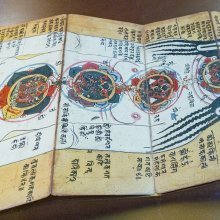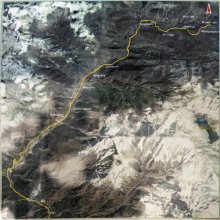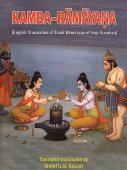Nadi, Nādi, Nadī, Nāḍī, Nādin, Nāḍi, Nadin: 51 definitions
Introduction:
Nadi means something in Buddhism, Pali, Hinduism, Sanskrit, Jainism, Prakrit, the history of ancient India, Marathi, Hindi. If you want to know the exact meaning, history, etymology or English translation of this term then check out the descriptions on this page. Add your comment or reference to a book if you want to contribute to this summary article.
Nadi has 47 English definitions available.
Images (photo gallery)
Languages of India and abroad
Sanskrit dictionary
[Deutsch Wörterbuch]
Source: Cologne Digital Sanskrit Dictionaries: Böhtlingk and Roth Grosses Petersburger WörterbuchNadi (नदि):—
--- OR ---
Nāḍi (नाडि):—s. nāḍī .
--- OR ---
Nāḍī (नाडी):—
--- OR ---
Nādi (नादि):—(von nad) adj. rauschend [Pāraskara’s Gṛhyasūtrāṇi 3, 13.]
--- OR ---
Nāḍī (नाडी):—
1) Spalte [Kathāsaritsāgara 60, 30. Z. 8. fg.] streiche pravṛttā bis tathā . . —
7) [Sāhityadarpana 515.] [Oxforder Handschriften 237,a,10.] — Vgl. mahā .
Source: Cologne Digital Sanskrit Dictionaries: Böhtlingk and Roth Grosses Petersburger WörterbuchNādin (नादिन्):—(von nad oder nād)
1) adj. laut schallend, tönend [Harivaṃśa 8069.] tönend [ŚIKṢĀ 39.] Häufig am Ende eines comp. schallend, laut tönend, brüllend, schreiend: snigdhagambhīranādinyā girā [Mahābhārata 2, 987.] pramathyamānārṇavadhīranādinī (jyā) [Raghuvaṃśa 3, 59.] jīmūtarava (ratha) [Mahābhārata 1, 7934.] ambudavṛnda (ratha) [8, 4949.] megha, parjanyasama (ratha) [Rāmāyaṇa Gorresio 2, 13, 23. 25.] sajalāmbuda (śūra) [Mahābhārata 7, 7167.] veśmasu mṛdaṅganādiṣu ertönend von [Raghuvaṃśa 19, 5.] kaṅkasārasanādinī (nadī) [Harivaṃśa 13816.] jyātalasvana (narasiṃha) [Mahābhārata 10, 557.] Vgl. khara, gardabha . —
2) m. Nomen proprium a) eines Dānava [Harivaṃśa 12941.] — b) eines in eine Gazelle verwandelten Brahmanen [Harivaṃśa 1210.]
--- OR ---
Nādin (नादिन्):—
1) bhūryabhidhmātagośṛṅganādinī (bhillasenā) lärmend mit [Kathāsaritsāgara 59, 41.] — Vgl. megha .
Source: Cologne Digital Sanskrit Dictionaries: Sanskrit-Wörterbuch in kürzerer FassungNadi (नदि):——
1) m. etwa Rufer. Nach [Sāyaṇa. ] = stuti. —
2) *am Ende eines adv. Comp. = nadī Fluss.
--- OR ---
Nāḍi (नाडि):—f. = nāḍī Ader , Gefäss des thierischen Leibes [Bhāgavatapurāṇa 2,10,29.3,30,17.]
--- OR ---
Nāḍī (नाडी):—f. (Nom. nāḍīs in der ältesten Sprache) —
1) Rohre. —
2) Spalte. —
3) ein röhrenartiges Gefäss im Leibe , Ader u.s.w. —
4) Pfeife , Flöte. —
5) Fistel. —
6) Büchse am Rade. —
7) *eine Grasart , = gaṇḍadūrvā. —
8) Puls. —
9) ein best. Zeitmaass , = 1/2 Muhūrta. —
10) *Gauklerei.
--- OR ---
Nādi (नादि):—Adj. rauschend , lärmend.
Source: Cologne Digital Sanskrit Dictionaries: Sanskrit-Wörterbuch in kürzerer FassungNādin (नादिन्):——
1) Adj. laut schallend , — tönend , tönend überh. Am Ende eines Comp. schallend — , laut tönend — , brüllend — , schreiend wie , lärmend mit , ertönend von. —
2) m. Nomen proprium — a) eines Dānava. — b) eines in eine Gazelle verwandelten Brahmanen.
Sanskrit, also spelled संस्कृतम् (saṃskṛtam), is an ancient language of India commonly seen as the grandmother of the Indo-European language family (even English!). Closely allied with Prakrit and Pali, Sanskrit is more exhaustive in both grammar and terms and has the most extensive collection of literature in the world, greatly surpassing its sister-languages Greek and Latin.
See also (Relevant definitions)
Starts with (+196): Nadi blue grass, Nadi bluegrass, Nadi Kassapa, Nadi Sodhana, Nadi Sutta, Nadi-buda, Nadi-niyantran, Nadi-niyantrana, Nadia, Nadiavatti, Nadibhallataka, Nadibhandagama, Nadibhanga, Nadibhava, Nadibheda, Nadibhinna, Nadibudu, Nadica, Nadica Phatakala, Nadicakra.
Ends with (+368): Abhinadi, Abhranadi, Adanadi, Addanadi, Adnadi, Adyanadi, Aiyanati, Akanadi, Akanati, Alambunadi, Amaranadi, Ambaranadi, Ambunadi, Amshunadi, Anadi, Anakkunadi, Anati, Angaranadi, Anjanadi, Annadi.
Full-text (+875): Svarnadi, Girinadi, Nadimandala, Nadicakra, Cakranadi, Garbhanadi, Nadija, Nadikula, Pratinadi, Pretanadi, Ushnanadi, Nali, Nadimdhama, Nadinakshatra, Nadanadipati, Nadiraya, Nadidatta, Nadika, Nadivanka, Nadimdhaya.
Relevant text
Search found 151 books and stories containing Nadi, Nādi, Nadī, Nāḍī, Nādī, Naḍi, Nādin, Nāḍi, Ṇaḍī, Ṇadī, Ṇāḍi, Ṇāḍī, Nadin, Nadee; (plurals include: Nadis, Nādis, Nadīs, Nāḍīs, Nādīs, Naḍis, Nādins, Nāḍis, Ṇaḍīs, Ṇadīs, Ṇāḍis, Ṇāḍīs, Nadins, Nadees). You can also click to the full overview containing English textual excerpts. Below are direct links for the most relevant articles:
Shat-cakra-nirupana (the six bodily centres) (by Arthur Avalon)
The Agni Purana (by N. Gangadharan)
Chapter 352 - Narration of the finished forms of the substantives in the feminine
Chapter 128 - The Koṭacakra—a drawing to forecast results
Chapter 126 - Combinations of good and bad asterisms (nakṣatra-nirṇaya)
Thirty minor Upanishads (by K. Narayanasvami Aiyar)
Subala Upanishad of Shukla-yajurveda, Chapter IV
Varaha Upanishad of Krishna-Yajurveda, Chapter V
Bhagavatpadabhyudaya by Lakshmana Suri (study) (by Lathika M. P.)
Tāntric Measures < [Chapter 3 - References to Śaṅkara’s Philosophy]
Pūrṇa River < [Chapter 4 - Similarities and Dissimilarities]
Taittiriya Upanishad (by A. Mahadeva Sastri)
Chapter VI - States of Consciousness < [B - Brahmavidyā Explained]
Lesson VI - Contemplation of Brahman < [Book I - Shiksha Valli]
Chapter III - Brahman’s Existence as Jīva < [B - Brahmavidyā Explained]
Related products






